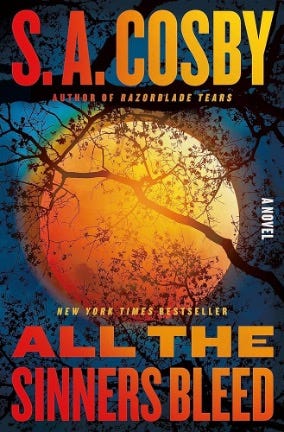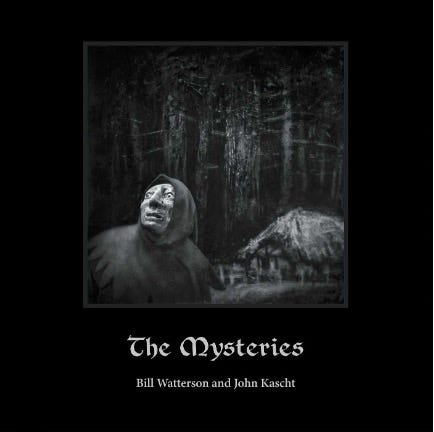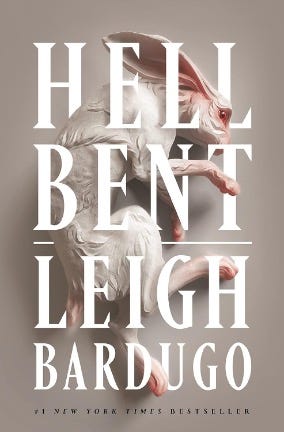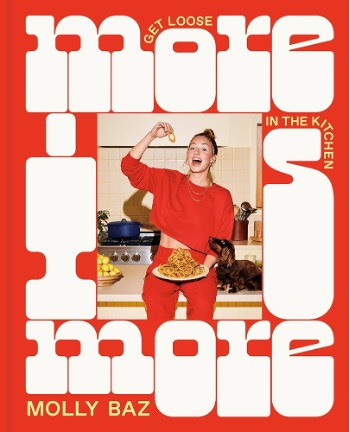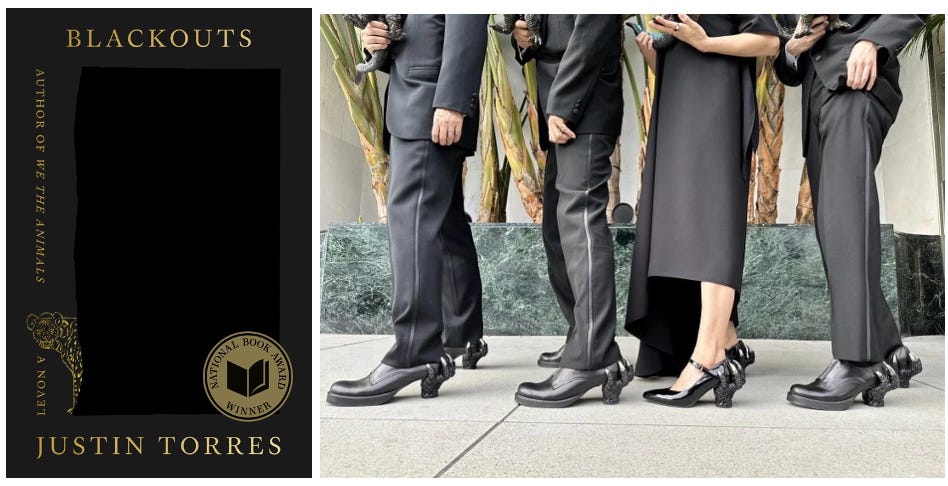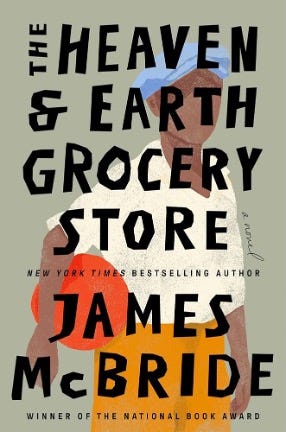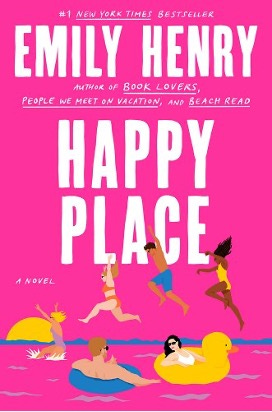OPENING MONOLOGUE
Welcome to the 2nd annual Oscar for book awards presented by the Academy of Literature. This is a made-up award program where we give out awards to books published last year that mirror the actual winners of the 96th Academy Awards that aired last Sunday. Like the most prestigious awards for film, these awards have little to do with honoring books for their artistic achievement or quality (although sometimes that happens, largely by accident), but exist to smash the worlds of movies and books together in order to answer important questions like: What was last year’s Oppenheimer commercial/critical juggernaut equivalent in books? Who is the Martin Scorsese, Killers of the Flower Moon, Lily Gladstone, ultra-snub of last year’s literature? What strange, original debut novel came out of nowhere like the French courtroom drama Anatomy of a Fall to suddenly become a cultural force? Let’s start the show and find out.
ACT ONE
Supporting Actor & Actress | Best Work of Genre
Oscar Winner: Da’vine Joy Ranolph (The Holdovers) + Robert Downey Jr. (Oppenheimer)
Academy of Literature Winner: All the Sinners Bleed by S.A. Cosby
S.A. Cosby parallels both winners of the supporting actor award this year. At the start of his career he was more like Da’vine Joy Ranolph. Like Da’vine, Cosby did a lot of work (not just writing) before, at 48, he blew up and hit it big with his exceptional novel Razorblade Tears. Da’vine has been a consistent working actor who didn’t get a lot of opportunities for big roles until The Holdovers. Now, at 37, she’s an Oscar winner, and hopefully on her way up.
But the novel that takes this award specifically, S.A. Cosby’s latest All the Sinners Bleed is more like Robert Downey Jr.’s win for best supporting actor for his performance in Oppenheimer. All year All the Sinners Bleed has been a coronation and celebration of S.A. Cosby who has entered the vaunted space of an established, consistently bestselling crime writer that both readers and critics love. Like RDJ, Cosby is known and beloved by many and has an infectious personality and a backstory that makes him easy to root for. Personally, I liked All the Sinners Bleed quite a bit, but it wasn’t my favorite of his. But, like with RDJ, the spotlight S.A. Cosby has received throughout the year has been deserved as much for the individual performance as for his body of work.
Animated Feature + Animated Short | Best Non-Adult Book
Oscar Winner: The Boy and the Heron (directed by Hayao Miyazaki)
Academy of Literature Winner: The Mysteries by Bill Watterson (illustrated by John Kascht)
Did you know that the acclaimed creator of the Calvin and Hobbes comic strip put out this weird, kind of spooky looking adult, illustrated fable? Me neither. Compared to famed animator Hayao Miyazaki’s previous works, The Boy and the Heron is reportedly a bit slower, more philosophical, and less whimsical, childlike. We could ask both of these respected masters of their crafts why they seem to be touching on darker material, but neither of them showed up to accept their awards.
Original Screenplay | Best Debut Novel
Oscar Winner: Anatomy of a Fall (directed by Justine Triet)
Academy of Literature Winner: Chain-Gang All-Stars by Nana Kwame Adjei-Brenyah
Isn’t it strange that a French legal drama became such a sensation? The same goes double for Chain-Gang All-Stars, which is about, *double checks notes*, a future in which prisoners fight each other to the death in order to gain freedom. That a novel with roughly the premise of aughts cable classic Death Race was lauded as a literary triumph, picked by Jenna Bush for her generally middle America Today show book club, and despite its dark subject matter was called “fun” by The New York Times, remains a tremendous outlier of 2023. Anatomy of a Fall, which is fundamentally a serious drama about a wife (maybe) killing her husband has a lot of “fun” things surrounding it like Messi the dog and the steel drum version of 50 Cent’s P.I.M.P. Oh, and like we’re finally recognizing and awarding Justine Triet, a director of numerous acclaimed films in France, we’re technically awarding Nana Kwame Adjei-Brenyah for his debut novel but his second book after his critically-acclaimed story collection Friday Black.
Adapted Screenplay | Best Book in an Ongoing Series
Oscar Winner: American Fiction (directed by Cord Jefferson)
Academy of Literature Winner: Hell Bent by Leigh Bardo
This is the first Oscar award winner that is so very close to the book it’s based on (Erasure by Percival Everett). You should go read about why American Fiction is such a fantastic, evolutionary adaptation of the novel and completely deserving of this award by this smart newsletter writer person: here. But for a 2023 published book analogy, we’re giving best book in an ongoing series (best adapted screenplay) to Hell Bent, Leigh Bardo’s second book in her series that takes an inventive, magical, and cutting, spin on Yale’s Skull and Bones secret society/fraternity. Like how a movie about book publishing could be as good as American Fiction, it is equally surprising that a book with this dead, hairless-looking rabbit on the cover could be a #1 New York Times bestseller. Haven’t read these yet, but they must be good, right?
Makeup and Hairstyling | Best Publicity and Marketing Campaign
Oscar Winner: Poor Things (directed by Yorgos Lanthimos)
Academy of Literature Winner: Pineapple Street by Jenny Jackson
Many insiders in the book industry write books, but not many execute the full-press marketing and publicity push like Pamela Dorman Books did for Knopf-editor-turned-author Jenny Jackson. Jackson had every insider connection in the world, those materialized into huge author support and media coverage, and it worked (if you scroll to the “praise for” link in the above you’ll see about forty quotes from other authors and publications, among the most I’ve ever seen for a book…ever). Yorgos Lantimos has a similar riches-to-riches trajectory with Poor Things this awards season—he’s been acclaimed ever since The Lobster, and his last film The Favourite was nominated for nine Oscars. Jokes have ensued as to which actresses should hop into the Lantimos machine next, as in back-to-back films his lead actresses Olivia Colman and Emma Stone have taken home Oscar gold. Pineapple Street I’m sure made many an editor stop and think they should try their hand at writing a novel.
Production Design | Illustrated, Cook, or Photography Book
Oscar Winner: Poor Things (directed by Yorgos Lanthimos)
Academy of Literature Winner: More is More by Molly Baz
Honestly, I couldn’t think of a much better parallel for the fantasy, maximalist film Poor Things than food influencer, it-girl Molly Baz’s aptly named More is More. Like Poor Things the excess of style may not be everyone’s speed, but there’s no arguing that it stands out.
Costume Design | Best Commercial Book Cover
Oscar Winner: Poor Things (directed by Yorgos Lanthimos)
Academy of Literature Winner: Amazing Grace Adams by Fan Littlewood
Amazing Grace Adams is in the commercial tradition that has proliferated ever since Eleanor Oliphant Is Completely Fine took by the world by storm. A kind of lone woman narrator, hyper-fixed point of view novel, something that’s very much in coversation with Poor Things and its one-woman-goes-on-a-journey story. Why this wins best commercial book cover (costume design) is that it takes such a familiar trope we’ve now seen hundreds of times of illustrated protagonist and raises the stakes by exactly one finger. Somehow it manages to look good and inviting to the exact kind of audience it’s going for too. It’s a bold choice, and shame on some retailers for censoring the bird with a sticker or quote.
International Feature | Best Work in Translation
Oscar Winner: The Zone of Interest (directed by Jonathan Glazer)
Academy of Literature Winner: Roman Stories by Jhumpa Lahiri
I’m not sure this movie/book are at all related thematically. The thing I found amusing is that The Zone of Interest is a UK film that won “international feature” for a movie set in Germany and that Lahiri is a native English speaker and writer who decided to write in Italian and translate herself back into English. Some would argue that for these reason they shouldn’t win these awards, but not me. The UK is international as much as anywhere else and Lahiri is a work in translation even if she’s just choosing to write in the hardest way possible.
Visual Effects | Best Cover Art
Oscar Winner: Godzilla Minus One (directed by Takashi Yamazaki)
Academy of Literature Winner: Blackouts by Justin Torres
This cover is just great, there’s not a lot to wax poetic about other than to say it’s artistic, bold, and eye-catching. Just like Godzilla Minus One and their crew’s amazing visual choices, which extended to wearing “Godzilla heels” together on the red carpet.
Documentary Short | Best Book with Origin in a Magazine/News Article
Oscar Winner: The Last Repair Shop (directed by Kris Bowers and Ben Proudfoot)
Academy of Literature Winner: Better Living Through Birding by Christian Cooper
This smallest of awards extracted the most pain and suffering to find a suitable book equivalent. Most books don’t advertise that they were adapted from an article and take some insider knowledge or some digging to unearth. It took doubly long to find something that was about the power of art and vocation to uplift people that mirrors The Last Repair Shop (a short documentary about getting classical music into public schools) and not, say, true crime. So, while Christian Cooper might have not written the precursor article to his book Better Living Through Birding, he did plenty of interviews around the time when he became national news that I’m sure were sent around with the book proposal. Birding, classical music, the bottom line is that hobbies can transform lives.
Documentary Feature | Best Nonfiction
Oscar Winner: 20 Days in Mariupol (directed by Mstyslav Chernov)
Academy of Literature Winner: The Undertow: Scenes from a Slow Civil War by Jeff Sharlet
Full disclosure: I’ve neither seen this documentary nor read this book. But both are incredibly timely and about ongoing wars of different kinds. As well as being equally as distressing and yet important enough to know you should seek them out.
INTERLUDE
This award newsletter is getting long, so go enjoy Ryan Gosling’s show stopping performance of “I’m Just Ken”, an incredibly game thing for an A-list actor to do.
ACT TWO
Live Action Short | Best Short Story or Essay Collection
Oscar Winner: The Wonderful Story of Henry Sugar (directed by Wes Anderson)
Academy of Literature Winner: A Stroke of the Pen by Terry Prachett
In a weird bit of kismet this is a live action short based off of an actual short story collection the category of book I choose to be the stand-in for the Literary Oscar. The Wonderful Story of Henry Sugar is another Oscar winner that I wrote about earlier last year when it came out—spoiler: it wasn’t the best of the Anderson’s Dahl shorts. Our winner, another Englishman, Terry Pratchett is best known for his novel Good Omens, which can share that unique sense of British dark humor that Dahl has. Pratchett who is no longer with us, had his stories rediscovered and published last year, a fitting likeness to Anderson reviving Dahl’s work.
THE OPPENHEIMER SWEEP
Best Picture | Best Book
Best Actor and Actress | Best Writer of the Year
Director | Masterwork
Music (Original Score) | Best Book Title
Cinematography | Achievement in Sentence Level Writing
Film Editing | Best Editing
Oscar Winner: Oppenheimer
Book Oscar Winner: The Heaven and Earth Grocery Store by James McBride
Like last year’s dominant film Everything Everywhere All at Once, I’m both surprised and delighted that there is a perfect book equivalent to this year’s Oppenheimer, and that is James McBride’s all encompassing, critically acclaimed, million-copy (a film’s billion is a book’s million) bestseller The Heaven and Earth Grocery Store. We’re giving McBride six of the seven awards that Oppenheimer won—the best book of the year (best picture), masterwork (director), best writer (best actor), best book title (original score), and best sentence level writing (cinematography). The Heaven and Earth Grocery Store deserves them all.
We’ll start with the below-the-line categories and work our way up. The Heaven and Earth Grocery Store is a perfect book title. It hits a lot of different vectors that are hard to achieve all at once, it is both grand (“heaven and earth”) while being intimate (“grocery store”). Like a good music score it sounds both universal and is utterly unique and memorable. Once we’re inside of the book, McBride stands out as a sentence writer that is not your typical commercial bestseller. It is refreshing to see such a big, popular book with long, florid, complex sentence structures and digressions over punchy, declarative writing. Putting whether you like Heaven and Earth or Oppenheimer aside, there’s no doubting the technical artistry involved.
James McBride, like Christopher Nolan, has had plenty of success before this year. McBride is the author of previous big hits Deacon King Kong and The Good Lord Bird, just like Nolan is the director of huge movies like The Dark Knight and Inception. Both men are known quantities, respected and commercially successful, but nothing has come together for either like this crowning-achievement moment. What’s interesting is that there’s a case for both that they are being rewarded at this point because they showed up with a project that has more down-the-middle, American history appeal. There’s a general feeling that neither work represents either’s absolute best piece of art. But sometimes to get a wide audience and be considered important something has to be sacrificed in the way of making challenging artistic choices.
SNUBS
Barbie (directed by Greta Gerwig) | Happy Place by Emily Henry
These pink juggernauts of elevated, commercially satisfying crowd pleasers both outsold their counterparts that would go on to grab glory in Oppenheimer and Heaven and Earth. Certain genres of books and films—romantic comedy and comedy in these cases—simply don’t get awards even though they are deeply loved and appreciated by many.
The Holdovers (directed by Alexander Payne) | Tom Lake by Anne Patchett
Both are like a warm hug, made with the skill of an undeniable craftsperson. When you see The Holdovers, you come out feeling as if you saw a Movie, when you read Tom Lake, A Novel. Such a timeless mastery and steady hand might hold these back from gaining the ultimate acclaim, but what we wouldn’t do to have a few more novels and films each year that were this satisfying, assured, and emotionally impactful.
Killers of the Flower Moon (directed by Martin Scorsese) | Age of Vice by Deepti Kapoor
This film and this book absolutely blew my hair back, dealt with serious issues on large canvases. Yet both were not critically and commercial received as well as they should have been considered their originality and quality. These weren’t disasters by any means, but maybe they are both just too long as the complaint goes. But I’d rather sit through one four-hour movie or read one 800-page book that’s great over consuming two that are mildly good. Take a lesson from both novel and film that greed may be the way of the world, but it often leads to ruin.
Dua Lipa | Big Swiss by Jen Beagin
Consistent readers of Dear Head of Mine know that I will find any excuse to mention Big Swiss, one of my favorite novels from last year. Likewise, the Oscar broadcast took every opportunity to play Dua Lipa’s undeniable hit Dance the Night, more than any other song over the course of Sunday night. This despite the fact that two other songs from the same film were nominated for an Oscar and Dua was not. Neither Dua or Beagin take home awards, but their so cool and so good did they really need them anyway?




